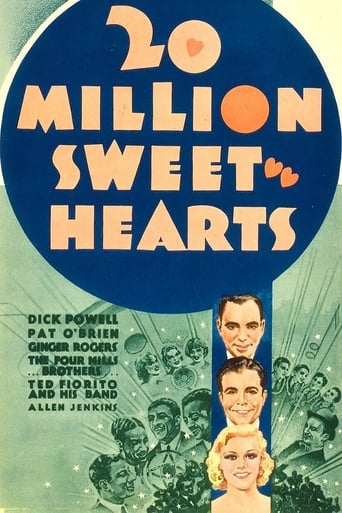mark.waltz
Vallee and Crosby have their work cut out for them as new radio sensation Dick Powell threatens to knock them off the shelf in the competition of crooners. Pat O'Brien is desperate to score a new radio romeo in order to get back in good with boss Grant Mitchell who fired him because he couldn't find another Crosby or the now forgotten Ross Columbo. Every movie studio had a top crooner, it seems, and Powell, already established as Warner Brothers' top singing dog, gets to spoof that image. This Warner Brothers musical comedy successfully spoofs the image of the popular male singers of the time, not really altered until some skinny guy named Frankie came along to knock these heartthrobs off the microphone.Having scored with wide eyed Ruby Keeler in a series of impressive dance musicals, Powell gets a popular rising star from RKO as his leading lady here, and she ain't dancin' with the skinny but elegant Fred. Ginger Rogers, who had supporting roles in a couple of those smash hits with Powell, has her only romantic co- starring role opposite him, and she's a combination of fiery cynicism and good hearted sweetness. This is Warner Brothers musical comedy at its most delightful, and no matter how silly it gets at times, there's never a shortage of delights on it. In addition to a song from Ginger herself, there's also performances from specialty acts like the Mills Brothers and the comical Radio Rogues who imitate popular acts of the time. Fine support also is provided by Allen Jenkins who was one of the top cynical comics of his day. Powell's repeated "I'll String Along With You", is seemingly over and over, but for so be reason, I don't get tired of it. The rhythms of the 1930's will put a song in your heart, and the melody still lingers on 80+ years later.
blanche-2
What a fun film, and what an education about the entertainment field, taking us back to the early '30s and the importance of radio.Pat O'Brien has one of his wheeler-dealer roles as Russell Blake, an agent who's not delivering the great talent he's promised his boss but keeps getting pay advances nonetheless. Finally he's fired. However, at a restaurant, he hears a singing waiter, Buddy Clayton (Dick Powell) do a goofy "The Man on the Flying Trapeze" and brings him to the attention of the radio station. Reluctantly, his boss (Joseph Cawthorne) gives Buddy an audition - and is immediately sorry. Admittedly it's hard to hear Buddy's real voice singing the Flying Trapeze song.Eventually, however, everyone hears Buddy sing and a radio show sponsor wants him. The current singer, Peggy Cornell (Ginger Rogers) clicks with Buddy, which makes for complications.The score by Dubin and Warren is very good, as well as other songs, and there are performances by the Mills Brothers, bandleader Ted Fio Rito, Ginger Rogers, and The Radio Rogues.The versatile Dick Powell had a beautiful tenor voice, showcased here, and Rogers is delightful. They made a cute couple. Besides his in front of the camera talent, Powell was a very astute businessman and had a keen eye for talent himself. During his career, he acted, produced, directed, and was responsible for giving Aaron Spelling and Sam Peckinpah their starts. Rogers of course would go on to do her films with Astaire.Fun film, some good music, loved the cast.
dougdoepke
Fast-talking agent (O'Brien) promotes radio career of promising crooner (Powell) despite obstacles.The first half is very enjoyable with a behind-the-scenes look at radio, the Mills Brothers, O'Brien's matchless chutzpah, and Powell's knockout rendition of "I'll String Along with You". Apparently, however, the screenwriters had another 30 minutes to fill, so they recycled much of the first half. The trouble is that unlike love and the old song, the plot etc. is not better "the second time around". What's really unfortunate is that the fine signature tune is repeated to the point of tedium. Too bad the film didn't quit while ahead.Of course, watching Rogers at this career stage remains a treat even if she's more subdued than usual. While O'Brien machine guns out more words per second than a dragster spits out rpm's. His promotional drive almost amounts to a force of nature. At the same time, Powell does his tuneful tenor bit as a "Lochinvar from California" heart-throb". However, some of his facial expressions while crooning the musical's last number are borderline clownish.All in all, the impression is of a pleasant lower-end musical whose repetitive material over- stretches a solid core of performers and a great signature tune.
bensonj
When Lee Tracy plays a promoter who gets fired but tries to promote a nobody anyhow, that's chutzpa; when Pat O'Brien is in the role, it just seems like failure with bluster. If Tracy tried to break up the happy couple it would be playing the "game" too far, and he'd really regret it later. O'Brien just seems like a heel, and there's no sense of his remorse even when he belatedly fixes things up. RKO's similar PROFESSIONAL SWEETHEART, also with Ginger Rogers and made the year prior, is a much better, much funnier film, although even it doesn't have the timing and ensemble playing of the very best Warners films. Unfortunately, TWENTY MILLION SWEETHEARTS isn't one of the best Warners films by a long shot; it's too long, too flabby, not smartly written, and with a weaker cast than the RKO film (Cawthorne is not Ratoff). The story has Powell singing several songs more than once, and he sings them all the way through each time. And they're not great songs. The Mills Brothers are great, but their two numbers are placed back-to-back (perhaps to more easily excise them in the South). And the plot doesn't really make much sense. One has to assume that this was made LATE in 1934, after the stringent implementation of the Production Code. (But Ginger is splendid anyhow.)



